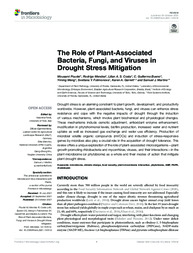The role of plant-associated bacteria, fungi, and viruses in drought stress mitigation.
The role of plant-associated bacteria, fungi, and viruses in drought stress mitigation.
Author(s): POUDEL, M.; MENDES, R.; COSTA, L. S. A. S.; BUENO, C. G.; MENG, Y.; FOLIMONOVA, S. Y.; GARRETT, K. A.; MARTINS, S. J.
Summary: Abstract: Drought stress is an alarming constraint to plant growth, development, and productivity worldwide. However, plant-associated bacteria, fungi, and viruses can enhance stress resistance and cope with the negative impacts of drought through the induction of various mechanisms, which involve plant biochemical and physiological changes. These mechanisms include osmotic adjustment, antioxidant enzyme enhancement, modification in phytohormonal levels, biofilm production, increased water and nutrient uptake as well as increased gas exchange and water use efficiency. Production of microbial volatile organic compounds (mVOCs) and induction of stress-responsive genes by microbes also play a crucial role in the acquisition of drought tolerance. This review offers a unique exploration of the role of plant-associated microorganisms?plant growth promoting rhizobacteria and mycorrhizae, viruses, and their interactions?in the plant microbiome (or phytobiome) as a whole and their modes of action that mitigate plant drought stress.
Publication year: 2021
Types of publication: Journal article
Unit: Embrapa Environment
Observation
Some of Embrapa's publications are published as ePub files. To read them, use or download one of the following free software options to your computer or mobile device. Android: Google Play Books; IOS: iBooks; Windows and Linux: Calibre.
Access other publications
Access the Agricultural Research Database (BDPA) to consult Embrapa's full library collection and records.
Visit Embrapa Bookstore to purchase books and other publications sold by Embrapa.

